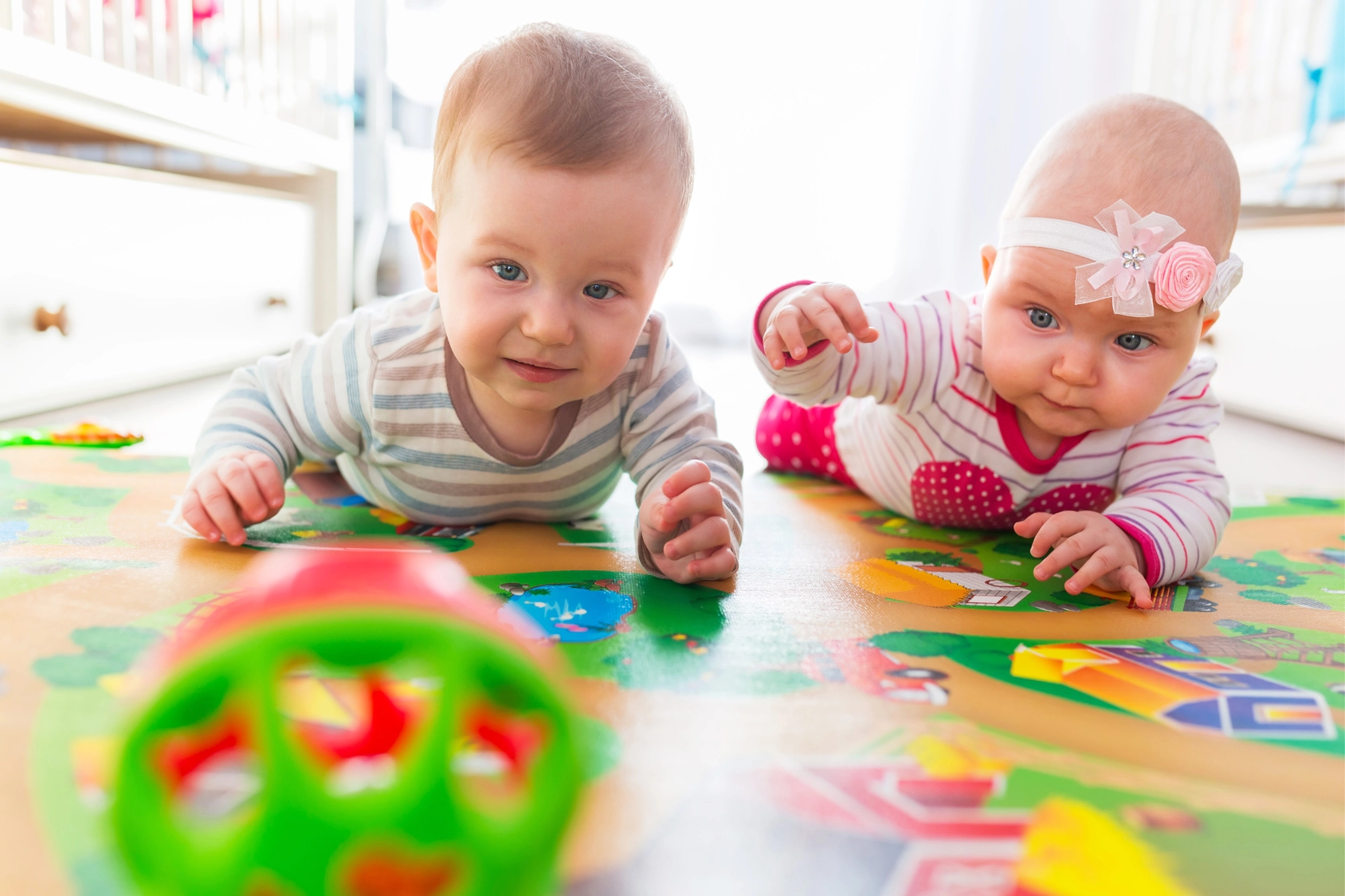By Dara Lovitz, Esq.
Try your best to imagine experiencing almost every moment in life with another person who is the same age, has the same number of siblings and parents, has the same last name, lives in your house, goes to the same school, has the same teacher, and goes through life on the same waking, eating, playing, bathing, and sleeping schedule as you. That is how many twins go through their early years of life.
The individuation process that every young child experiences is complicated for twins – they not only have to learn to separate from their parents, they also have to learn to separate from their twin sibling, to whom they are so deeply connected from birth. Parents can impede the process by raising them into existence as a pair of children instead of as two single children. Research suggests that twins who were treated as a solitary unit by their parents had more difficulty forming their individual identities than twins who were treated more distinctly.
It could be argued that parents of twins generally have a more challenging early parenting experience than parents of singletons. There are countless considerations a parent of twins has to make that her parenting peers who have singleton children never face, like spoon-feeding two hungry babies at the same time, maneuvering a double stroller through the super-market, or (brace yourself) having to choose which child’s college graduation to attend when both twins’ college graduations occur on the same weekend in different cities.
So what could a parent of twins possibly learn from a parent of singletons? At least one very important thing: how to raise a singleton — well, at least how to make our twin children’s experiences more like that of their singleton peers.
Yes, by making some easy adjustments, we parents can help our twin children feel more like unique individuals and less like a mere half of a pair.
In that spirit, I compiled these top 6 tips for encouraging individuality.
1) RETHINK THE RHYMES
Let’s face it: it’s cute and it’s fun to name your twin children Will and Jill or to use alliteration and call them Beverly and Bella. When we do this, however, we reinforce the notion that they are each part of a set as opposed to two separate individuals. If you have already chosen such names, perhaps you can give at least one of them a nickname –a nickname that doesn’t rhyme with the other child’s name, for heaven’s sake! Related side note: always refer to your children by their names rather than referring to them as “the twins.” And take the time to encourage relatives and friends to respect and follow your lead here. The rule is important whether your children are within earshot or not. It’s critical that you and other essential people in their lives develop the habit of talking about them and thinking of them as individuals.
2) DRESS THEM DIFFERENTLY
Again, the cuteness factor reigns here: who doesn’t love the attention one receives when she’s walking her twins down the street and they are wearing the same exact outfit, down to the color and brand of shoe? It’s undeniably adorable to see little twins dressed alike. Still, by doing so, you are unintentionally sending the message to them and the world that they are simply two peas in a pod. Two perfectly identical peas in a pod. But your children are not uniform vegetables; they are exceptional animate beings with distinguishing personalities and traits. If you simply cannot resist putting them in the same outfit for a photo, allow yourself some slack and take the darn photo. But most of your photos should instead help to celebrate them as the extraordinary individuals that they are. When your twins are old enough, encourage them to pick out their own clothes. They may choose to match each other at times, but believe me, there will be times when they want to look nothing like one another.
3) DON’T FORCE THEM TO SHARE
When we were little, we were taught to share. So when our kids are young, we instinctively tell them they have to share. Sharing is an important skill that young children must develop in order to succeed socially.
BUT, your twins will be asked to share exponentially more times than the average singleton child for the simple reason that twins generally have more opportunities to share by virtue of playing in the same room together for most of their waking hours. And even though one of your twin children will almost always be playing with her twin sibling, she shouldn’t always be forced to share. In fact, she should have things that are hers and hers alone — things over which she can rightfully assert jurisdiction. Having one’s own things is essential to helping a child develop her sense of self, which is critical for a child who is a twin.
If it’s possible financially and logistically to put the twin children in separate rooms, do so to allow each of them to claim her own space. If two separate rooms are not available, try to give each child her own space in the twins’ shared room (or in another room). Allow the child to decorate and organize the space as she wishes and support her efforts to ‘protect’ the space from unwanted intrusion by siblings.
4) (REALLY) LEARN WHO EACH ONE IS
Relate to, and converse with, your children individually. When your twin children are young, ask them questions about what they like and don’t like so that you can learn early on what makes each child tick. Learn (and don’t forget!) which child likes which food and which colors and which songs. When you’re alone with one of your children, tell him what you’ve observed about him – tell him which wonderful and distinct attributes about him make you the most proud.
5) MAKE TIME FOR ONE-ON-ONE INTERACTION
In order to really discover each child, you will need alone time with her during which she can feel comfortable to confide in you, without commentary or judgment from another family member. Engaging in separate activities with each child will further help bond you to each child as well as help the child feel special and unique.
Many adult twins will tell you that they cannot recall sitting down for one meal with a parent without their twin sibling present. Take your young twin child to her favorite restaurant alone, just the two of you. You’ll be amazed at how happy this will make her — and you’ll be amazed at how much she’ll open up and share!
It’s also important for others in your twins’ lives to have one-on-one time. If there are other non-twin children in the family, coordinate times for each twin to have separate time with the non-twin sibling(s). If you can arrange for your twins to have alone-time with grandparents, aunts, cousins, etc., all the better! This will help your relatives discover what’s particular and enchanting about each child and this will help your twin children feel more like individuals. And don’t forget to schedule different play dates for your children with different friends. It makes sense that two different kids might get along (or not get along) with different peers, right?
6) BIRTHDAY PARTIES SHOULD BE TAILORED FOR EACH TWIN
It’s conceivable that a twin child might feel shortchanged by having to share his birthday party every year. Discuss having separate birthday parties with each child in private. If one child wishes to celebrate separately, honor that wish and consider representing the decision for separate birthday parties as one you alone have made.
If you are welcoming birthday gifts for your twin children, gently guide relatives and friends as to the differing gift wish lists of each child. If your children are given identical gifts, separate your children or have them sit back-to-back when opening them. This way, each child can experience the joy and surprise of discovering the new gift without having it ruined by witnessing his twin sibling’s reaction upon unwrapping.
If your twins decide to share their birthday party, there are simple ways to make your twins’ birthday feel more special for each child: make a personalized toast to each child; bake (or buy) two separate cakes (with each child’s respective favorite flavors and decorations); and sing “Happy Birthday” twice.
Whether it’s a celebration of the magical day your twins were born or a weekend full of errands and play dates, always consider that there are two children involved – two children with very distinctive needs and desires. In fact, in any situation, you may want to ask yourself, what would a parent of a singleton do…?
Dara Lovitz, Esq., lives in Bala Cynwyd, Pennsylvania, and is the mother of two very different twin toddlers. She is the author of the popular children’s book, Catching Falling Cradles: A Gentle Approach to Classic Rhymes, and is working on her next book: an advice guide for parents of twins.







There is 1 comment